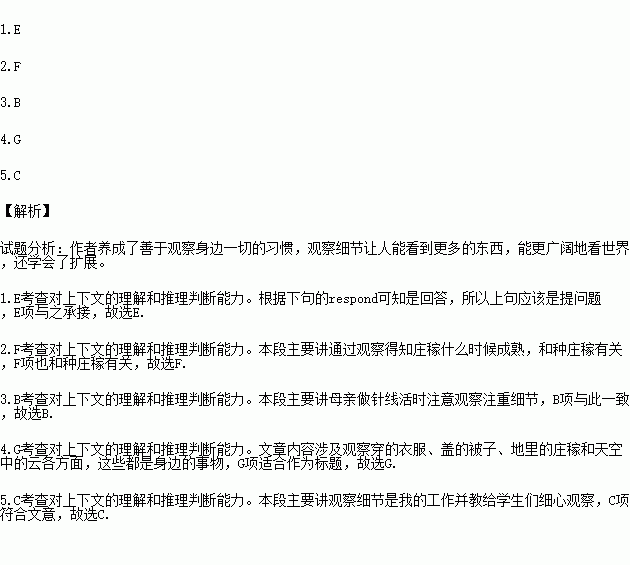题目内容
根据短文内容,从短文后的选项中选出能填入空白处的最佳选项。选项中有两项为多余选项。
From the time l was young,I've noticed changes in people's hairstyles, clothes, facial expressions and behaviors. 1. I respond, “I pay attention."
I believe in paying attention to the world around me, in the power of paying attention..
I grew up on our family farm, surrounded by fields of wheat, soybeans, and corn. My grandpa Bohil always had an eye to the sky, interpreting the clouds and their various colors. He knew when the soybeans got the color of brown paper bags it was time to harvest. He knew when the wheat rustled (沙沙作响) like scratchy dry skin it was time to harvest that, too. 2.
My mother sewed everything from curtains to clothes. She made quite a few of my clothes. Her pattern work was so precise, her seam(线缝)work so exact. Fittings were exercises in detail. 3. The women in my family practiced exacting crafts, requiring precision and an eye for detail, attention to color combinations, a love of a patterned world.
4. It was the clothes on my body, and the quilt on my bed. Noticing was the crops in the fields, and the clouds in the sky.
I' m a teaching writer. Seeing details is my job, both in my writing and in my students’. Nothing is too small to ignore. Noticing is my job. _5. I notice the sun and clouds on my pages and theirs, both the bright skies and the storms on the horizon.
The world is made up of one detail after another, and by opening my eyes to each of them, I can see the world much more clearly, much more broadly. By paying attention, I learn to expand.
A. So if I notice that your eyes look dull instead of bright, you will know why.
B. She would tear the seams and start over if something wasn 't quite right.
C. I sew, quilt, plant, cultivate, and harvest, alone and with my students.
D. My great-grandmother quilted blankets for each of us.
E. Often, people act surprised and ask, "You noticed?"
F. Farming is about noticing, about paying attention.
G. Noticing was all around me.

